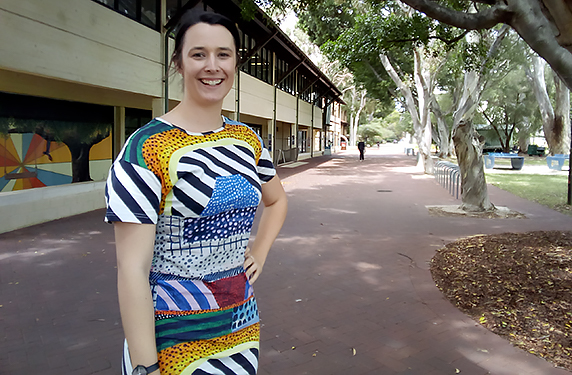Tara Broadhurst wants more girls to study science, technology, engineering and mathematics (STEM).
As UWA’s Girls in Engineering Coordinator, she’s keenly aware of female underrepresentation in the sector. In Australia, just 16 per cent of the STEM workforce is female (falling to 12 per cent in engineering and nine per cent in technology) – and she says that’s not good enough.
“We’re losing engagement with girls and women at every stage of the STEM pipeline, from as young as Year 3 until women finish their careers,” Tara said. “That’s a wicked, complex problem.”
The Athena SWAN program at UWA addresses the workforce end of this spectrum. Earlier this year, the University received an Athena SWAN Bronze Award for its commitment to gender diversity, with an action plan for attracting, retaining and developing a diverse range of high-performing STEM academics.
Girls in Engineering intervenes earlier in the pipeline. The outreach program visits high schools with the aim of smashing through barriers to female participation in STEM. Since 2013, the program has reached more than 8,500 high school students through on campus events, school visits, online programs, regional travel and teacher professional development.
The barriers to participation documented in the Australian Academy of Science’s Women in STEM Decadal Plan include stereotyping, bias, lack of role models, lack of understanding of STEM careers and disengagement from STEM subjects.
Tara believes female role models are crucial, which is why the program makes use of both university students and industry representatives. Career journeys are described honestly, and girls take part in everything from visiting mine sites to designing creative solutions to collect plastics in the ocean.
Feedback has been overwhelmingly positive. Surveys show an increased understanding of engineering and more positive perception of STEM among Girls in Engineering participants. Program enjoyment ratings sit at more than 90 per cent, while enrolments of females into Engineering Science as a first major at UWA have steadily increased. In 2020, they sit at 25 per cent, up from 21 per cent in 2019. Across Australia, meanwhile, women comprise just 16 percent of entry-level engineering students.
"In our conversations we need to understand that gender equity isn’t a women’s issue – it is everyone’s issue.
We can start by looking at what we can influence in the workplace, such as HR policies, culture, staff training and leadership, to take steps towards an equitable society."
Tara Broadhurst
Girls in Engineering Coordinator
While it’s not always an easy path to working in STEM – Tara changed her university major multiple times before settling on a neuroscience / psychology combination – the Girls in Engineering Coordinator hopes the girls who go through her program will be inspired to follow their interests.
“In STEM there’s a lot of technical knowledge needed, so you shouldn’t be afraid to put in hard work up front,” she said.
“You will fail, and you need to fail thousands of times to get it right. It’s about self-efficacy. You need a growth mindset, not a fixed mindset.”
Tara herself embodies the growth mindset. After reaching an executive role at a relatively young age (she became part of Scitech’s executive leadership team at 28 years old, overseeing 35 outreach staff who visited every school in the state), she decided to upskill.
She’s now studying her Master of Business Administration at UWA, with a specialisation in Social Impact.
“I was studying organisational change and economics when COVID-19 hit, so my timing was perfect to connect theory to practise,” she said.
“Change is constant and the rate of change will continue to accelerate in all industries. Some of the trends we’ve seen accelerated include the rise of technology, flexible working, doing more with less, and managing remote teams.”
Her MBA has allowed her to meet likeminded people – especially those who are interested in what it means to be a leader today – as well as fuelling her desire to drive positive social change. She’s particularly passionate about gender equity.
“In our conversations we need to understand that gender equity isn’t a women’s issue – it is everyone’s issue. We can start by looking at what we can influence in the workplace, such as HR policies, culture, staff training and leadership, to take steps towards an equitable society,” she said.
“Research shows that diverse teams have higher outputs, are more cost effective and produce better products for the end user.
“For Australia to remain competitive in an increasingly globalised society, we need to take seriously the importance of having all voices at the table.”
Reflecting the importance of inclusivity, the University has chosen ‘A more just and equitable world post COVID-19’ as one of its inaugural grand challenges, alongside climate change.
Tara’s pleased to see the issue being given such prominence. She saw the importance of equity firsthand while still a university student, when she took a gap year to teach at risk youth in New York City.
Her time at Scitech – where outreach included visits to remote communities accessible only by long drives through the desert – cemented her belief in offering opportunities to everyone.
“Working in equity is the continual acknowledgement that not everyone has the same access to opportunities and means, but this is not a reflection of their potential,” she said.
“Student Equity at UWA supports access to university through broad programs with Girls in Engineering as well as Aspire, Fairway, and Children’s University. These programs support current and future students and are complemented with opportunities such as the new Hackett Scholarship, which recognises excellence for graduating students from Broadway schools.
“We’re creating an ecosystem that’s supportive and inclusive and by building up one equity cohort, we’re supporting another. Equity isn’t a ‘nice to have’. Equity is an essential core of who we need to be.”

